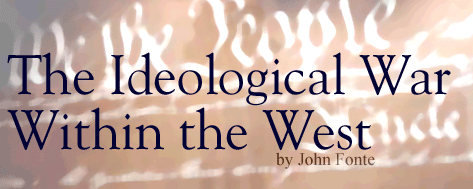
In this preview of an article due for publication in the
Summer issue of FPRI’s Orbis, the author takes a markedly
conservative position on a controversial question that has arisen since
September 11, 2001. He suggests there has arisen a conflict within the
democratic world between liberal democracy and transnational
progressivism, between democrats and what he calls
post-democrats.
Countering views,
anyone?
—Ed.
Nearly a year before
the September 11 attacks, news stories provided a preview of the
transnational politics of the future. In October 2000, in preparation for
the UN Conference Against Racism, about fifty American nongovernmental
organizations (NGOs) called on the UN "to hold the United States
accountable for the intractable and persistent problem of
discrimination."
The NGOs included
Amnesty International-U. S.A. (AI-U. S.A.), Human Rights Watch (HRW), the
Arab-American Institute, National Council of Churches, the NAACP, the
Mexican-American Legal Defense and Educational Fund, and others. Their
spokesman stated that their demands "had been repeatedly raised with
federal and state officials [in the U. S.] but to little effect. In
frustration we now turn to the United Nations." In other words, the NGOs,
unable to enact the policies they favored through the normal processes of
American constitutional democracy—the Congress, state governments, even
the federal courts—appealed to authority outside of American democracy and
its Constitution.
At the UN Conference
against Racism, which was held in Durban two weeks before September 11,
American NGOs supported "reparations" from Western nations for the
historic transatlantic slave trade and developed resolutions that
condemned only the West, without mentioning the larger traffic in African
slaves sent to Islamic lands. The NGOs even endorsed a resolution
denouncing free market capitalism as a "fundamentally flawed
system."
The NGOs also
insisted that the U. S. ratify all major UN human rights treaties and drop
legal reservations to treaties already ratified. For example, in 1994 the
U. S. ratified the UN Convention on the Elimination of Racial
Discrimination (CERD), but attached reservations on treaty requirements
restricting free speech that were "incompatible with the Constitution."
Yet leading NGOs demanded that the U. S. drop all reservations and
"comply" with the CERD treaty by accepting UN definitions of "free speech"
and eliminating the "vast racial disparities… in every aspect of American
life" (housing, health, welfare, justice, etc.).